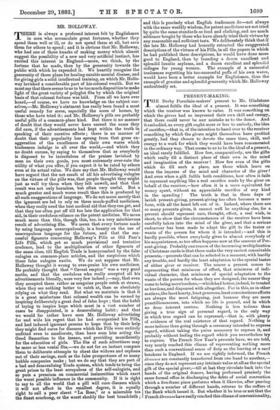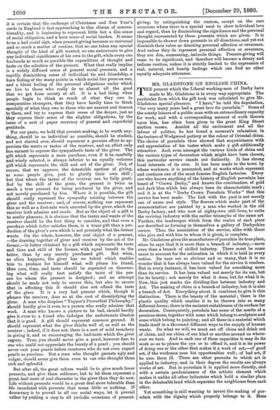PRESENT-MAKING.
THE Derby Porcelain-makers' present to Mr. Gladstone almost fulfils the ideal of a present. It was something which the receiver was known to value. It was something on which the givers had so impressed their own skill and energy, that there could never be any mistake as to the donor. And it embodied, as every gift ought more or less to embody, the idea of sacrifice,—that is, of the intention to hand over to the receiver something by which the givers might themselves have profited greatly, had they chosen to devote the same time, skill, and energy to a work for which they would have been remunerated in the ordinary way. That seems to us to be the ideal of a present, an ideal rarely fulfilled. How few, comparatively, are the gifts which really fill a distinct place of their own in the mind and imagination of the receiver ! How few even of the gifts which do fill such a place, are those which leave on them the impress of the mind and character of the giver ! And even when a gift fulfils both conditions, how often it fails to represent anything like a real sacrifice made by the giver on behalf of the receiver,—how often it is a mere equivalent for money spent, without an appreciable sacrifice of any kind
in the spending ! The truth is that in these days of lavish present-giving, present-giving too often becomes a mere
form, with all the heart left out of it. Indeed, where there are. so many presents given, it cannot well be anything else, for a present should represent care, thought, effort, a real wish, in. short, to show that the circumstances of the receiver have been carefully taken into the mind of the giver, and that a serious endeavour has been made to adapt the gift to the tastes or wants of the person for whom it is intended ;—and this is hardly possible, where everybody gives to almost everybody of his acquaintance, as too often happens now at the seasons of Pre- sent-giving. Probably one reason of the increasing multiplication of Christmas cards is that these make the very easiest conceivable presents,—presents that can be selected iu a moment, with hardly any trouble, and hardly the least adaptation to the special tastes of either giver or receiver. The nearer a present comes to representing that minimum of effort, that minimum of indi- vidual character, that minimum of special adaptation to the wants of the person for whom they are designed, the nearer they come to being mere burdens,—which had better, indeed, be treated. as burdens, and dispensed with altogether. For in this, as in other matters, the least hearty, least generous, least conscientious efforts are always the most fatiguing, just because they are mere punctiliousnesses, into which no life is poured, and in which no deep interest centres. Nothing is less tedious than giving a true sign of personal regard, in the only way in which true regard can be expressed,—that is, with plenty of evidence of the real existence of that regard. Nothing is more tedious than going through a ceremony intended to express regard, without taking the pains necessary to express it, and probably without feeling the regard which you nevertheless try to express. The French New Year's presents have, we are told, very nearly reached this climax of representing nothing more than such a conventional sense of duty as the leaving of a card betokens in England. If we are rightly informed, the French &relines are constantly transferred from one hand to another,— since they do not represent any intrinsic value at all as the special gift of the special giver,—till at last they circulate back into the hands of the original donors, having performed precisely the same formal office in discharging the debts of social convention which a five-franc piece performs when it likewise, after passing through a number of different hands, returns to the coffers of the Bank which issued it. But whether it be true or not that the French &relines have really reached this climax of conventionality,
it is certain that the exchange of Christmas and New Year's cards in England is fast approaching to this climax of conven- tionality, and is beginning to represent little but a dim sense of social obligation, and a keen sense of social burden. It seems to us a bad social sign, when present-giving becomes so universal and so much a matter of routine, that no one takes any special thought of the kind of gift wanted, no one endeavours to give any individual significance of his own to the gift, while every one husbands as much as possible the expenditure of thought and taste on the selection of the present. What that really implies is a widely diffused sense of general social pressure, and a rapidly diminishing sense of individual tie and friendship, a keen feeling of the many points in which social ties press on one, and a blunt feeling of the personal obligations under which we live to those who really do us almost all the good that we get from society at all. It is a bad thing when people begin to think so much of what they owe to comparative strangers, that they have hardly time to think specially of what they owe to those who are nearest and dearest to them, and try to express their sense of the deeper, just as they express their sense of the slighter obligations, by the issue of a sort of paper currency of general and superficial gratitude.
For our parts, we hold that present-making, to be worth any- thing, should be as individual as possible, should be studied, and not slurred over, should represent a genuine effort to ap- preciate the wants or tastes of the receiver, and an effort only less earnest to express the sympathetic taste of the giver. The gift which represents a mere purchase, even if it be carefully and wisely selected, is always inferior to an equally welcome gift which represents the skill and art of the giver. Not, of course, that we approve the detestable egotism of giving, as some people give, just to glorify their own skill ; but that where the tastes of the receiver can be fully grati- fied by the skill of the giver, the present is twice as much a true present for being produced by the giver, and not merely purchased by him. Where it is possible, the gift should. really represent the sympathy existing between the giver and the receiver; and, of course, nothing can represent this as well as a first-rate work executed by the giver, which the receiver both admires and needs. But as the object of a gift is to confer pleasure, it is obvious that the tastes and wants of the receiver should be the first thing to consider, and that even a purchase which better satisfies them, is a truer gift than a pro- duction of the giver's own which is not precisely what the former wants. On the whole, however, the real object of a present, —the drawing together of giver and receiver by the act of the former,—is better obtained by a gift which represents the taste and time and skill of the former, with equal benefit to the latter, than by any merely purchased gift. But when, as often happens, the giver has no talent which enables him to produce for himself what will please his friend, then care, time, and taste should be expended on discover- ing what will really best satisfy the taste of the per- son for whom the present is designed; and an attempt should be made not only to secure this, but also to secure that in effecting this it should also not offend the taste of the giver. It is a very bad present which, though it pleases the receiver, does so at the coat of dissatisfying the giver. A man who despises " Tupper's Proverbial Philosophy," should hardly give it even to a person who really admires that work. A man who knows a picture to be bad, should hardly give it even to a friend who indulges the unfortunate illusion that it is good. A gift should represent common ground. It should represent what the giver thinks well of, as well as the receiver ; indeed, if it does not, there is a sort of mild treachery in giving it, and so encouraging the bad-taste which the giver regrets. True, you should never give a pearl, however fine, to one who could not appreciate the beauty of a pearl ; you should never cast your pearls before creatures who do not even regard pearls as precious. But a man who thought garnets ugly and vulgar, should never give them even to one who thought them rich and splendid.
But after all, the great reform would be to give much fewer presents, and give them seldomer, but to let them represent a great deal more of real character in the giver than they do now. Life without presents would be a great deal more tolerable than life inundated with presents that mean little or nothing. If democracy is to prevail in all our social ways, let it prevail rather by putting a stop to all periodic occasions of present-
giving, by extinguishing the custom, except on the rare occasions where there is a special need to show individual love and regard, than by diminishing the signifiance and the personal thought represented by those presents which are given. It is impossible to shower down presents in all directions, and yet not diminish their valve as denoting personal affection or reverence. And unless they do represent personal affection or reverence, they are dim, unmeaning, imbecile things. Present-giving will cease to be significant, and therefore will become a dreary and tedious routine, unless it is strictly limited to the expression of real, natural, and hearty feelings which can find no other equally adequate utterance.



































 Previous page
Previous page